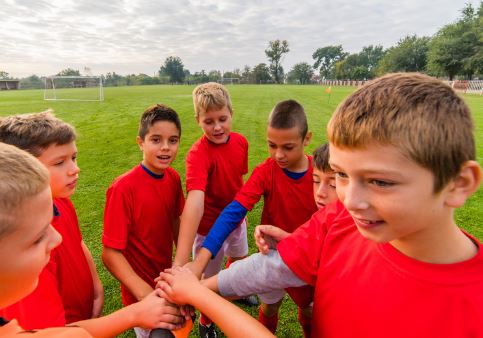
27 Nov Playing Well in the Game of Life
Sports serve as a sort of microcosm for life; you have to keep trying, you have to work hard, you win some, you lose some, you have soaring victories and crushing disappointments, and you’ve got to show up and play instead of simply letting the game pass you by. As parents, we want to raise resilient kids who get up and face the playing field again, even when they’ve been “tackled.”
Have you ever listened to Lewis Howes’ The School of Greatness podcast? We recently listened to two different interviews Lewis did—one with Erik Weihenmayer, and the other with Kyle Maynard. Weihenmayer climbed Everest blind, bagged all “7 summits,” and trained for six years so he could kayak the Grand Canyon. (Remember he’s blind?) Maynard, on the other hand, was born without arms or legs, but that hasn’t stopped him from being an avid sports enthusiast, exercise guru, competitive wrestler, mountain climber, and motivational speaker. Because young people often look for role models, we thought we’d share 5 things we learned from listening to these two avid athletes who haven’t let their “setbacks” in life stall their progress; if anything, those challenges have motivated their lives and helped them fully engage in the game.
1. As adults, how many of us have found ourselves in circumstances we didn’t anticipate? Maybe we lost a job, went through a divorce, or had to bury a child or spouse. How many of us have had life “fall apart,” so to speak, leaving us with the choice to sink or swim? Some people confront physical challenges, and others experience intense emotional pain. One of life’s universal truths seems to be that no one escapes struggle and opposition; it comes to all of us in the end, one way or another. Kyle touched on this idea when he said that 99% of “disabilities” aren’t outwardly obvious; most of us don’t wear them on our sleeves where they are easy for others to discern. As parents, we can’t anticipate what’s ahead for our children in their lives. But one thing is certain: we know they will encounter hard things.
2. Sometimes when life is particularly difficult, the way ahead seems unclear. That often feels frightening; it’s more comfortable to know what the plan is, or when the next bend in the road is coming. Once again, Kyle’s perspective is one we can pass on to our children: knowing something can actually create a “line in the sand,” a cap to curiosity. Not knowing, however, gives us the chance to engage in an unscripted process of finding out. If we’re willing to step into the unknown with possibility, really wonderful things can happen. Instead of living in fear, we can be alive to many opportunities.
3. Erik commented on the benefit of adversity when he said this: “Do you allow [barriers] to become the thing that stops you, or do you kind of gather up the energy that is created through that adversity and…harness it and ride that energy forward—maybe not to the place that you would have gone to, but maybe someplace brand new, maybe someplace you would have never gone in any other way….The path of most resistance is sometimes not the direction you want to go, but it’s the thing where you grow and learn the most.” Being able to find meaning in adversity is a way to find beauty in otherwise difficult experiences.
4. But what about those times when life is kicking our trash and we’re absolutely in the trenches? That’s when the rubber meets the road, and we’ll likely be in that place more than once in our lives. Erik says that the challenge for all of us is to get out of the “eddy” in our lives, overcome, and get back into the river’s flow. Why? Because when you’re in the main flow, you’re living a life that’s both engaging and satisfying.
5. Weihenmayer shared that the sherpas on Everest have a saying about how, when you reach the top of the mountain, you’ve only really done half of it. You still have to turn around and make it successfully back down. Life is like that too, right? As Erik said: “You’re not climbing these things or kayaking rivers as escapism, but hopefully, ideally, you’re taking these gifts down from the mountain that you’ve earned through struggle, through that flailing, through that bleeding, through that sense of self discovery, that path that we’re all on and…[you] use it in some way.”
As our kids engage in real-time games on the court, in the rink, in the pool, or on the field, the words of these inspiring men can help them stay committed. But their insight can be equally powerful for them as they engage in real life—when they have to make a critical play, consider their next move, or when they realize they lost a round and they’ve got to get up again, brush off their jersey, and head back for the team huddle.
Here at [insert company name], we enjoy the opportunities we are given to transport youth sports teams. Whether we are getting the kids, their coaches, and all the equipment to practice, an away game, or a state championship, we love the energy that exists with sports! Coaches are fantastic for team transportation because they have ample room, entertainment options, power, WiFi, and bathrooms on board for added convenience. As we drive the miles, you can hold a team meeting or watch clips of your opponent’s previous games and discuss strategies. We’d love to serve you the next time your team is ready to suit up and “bring it” to the game!
The material for this post came from Lewis Howes’ podcasts with Erik Weihenmayer and Kyle Maynard. Check them out here:
https://lewishowes.com/podcast/i-erik-weihenmayer/
https://lewishowes.com/podcast/i-stay-true-conquer-obstacle-kyle-maynard/


